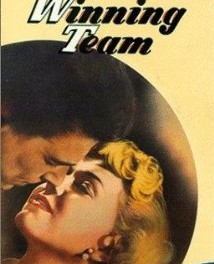WINNING TEAM, THE
(director: Lewis Seiler; screenwriters: Merwin Gerard/Seeleg Lester/Ted Sherdeman; cinematographer: Sidney Hickox; editor: Alan Crosland Jr.; music: David Buttolph; cast: Doris Day (Aimee Alexander), Ronald Reagan (Grover Cleveland Alexander), Frank Lovejoy (Rogers Hornsby), Frank Ferguson (Sam Arrants), Eve Miller (Margaret), James Millican (Bill Killefer, catcher), Russ Tamblyn (Willie Alexander), Gordon Jones (George Glasheen), Walter S. Baldwin (Pa Alexander), Kenneth Patterson (Dr. Conant), Hugh Sanders (Joe McCarthy); Runtime: 98; MPAA Rating: NR; producer: Bryan Foy; Warner Bros. Home Video; 1952)
“Its accuracy is in doubt, but it’s a competently made straightforward standard biopic on Hall of Fame pitcher Grover Cleveland Alexander.”
Reviewed by Dennis Schwartz
Its accuracy is in doubt, but it’s a competently made straightforward standard biopic on Hall of Fame pitcher Grover Cleveland Alexander (known as Alex the Great). Alexander’s wife served as the film’s technical adviser. Nevertheless the film offers the usual Hollywood mix of fact and fiction, with the fiction part relatively high (it chooses to ignore the pitcher’s epilepsy). It’s directed by Lewis Seiler (“The True Story of Lynn Stuart”/”The Smiling Ghost”/”Guadalcanal Diary”) and written by Merwin Gerard, Seeleg Lester and Ted Sherdeman. There are cameos by Big Leaguers from the 1950s: Bob Lemon, Gerald Priddy, Gene Mauch, Hank Sauer, Irv Noren and Peanuts Lowerey. Which makes it an OK nostalgia flick for old-timer baseball buffs (as a young baseball fan I was thrilled to get Cubs slugger Sauer’s autograph outside the Polo Grounds and appreciate seeing him on film). It also uses to good effect actual footage of the classic Cardinals and Yankees World Seies in 1926.
In 1908, in rural Elba, Nebraska, telephone linemen Grover Cleveland Alexander (Ronald Reagan), one of thirteen children, loves baseball, his feisty sweetheart Aimee Arrants (Doris Day) and is looking forward to buying a farm when married. When Alex stands up Aimee and her father (Frank Ferguson), who was set to present the couple with a wedding gift of a down payment on a ranch, in order to pitch against a Bush League team visiting from Galesburg, Illinois, he shuts out the paid pro ballplayers and gets recruited by their manager (Gordon Jones) to pitch for $100 a week.
However, during a game he is struck in the head by a relay throw from the infielder and is knocked unconscious, awakening with double vision. Inactive because of the injury, Alex marries Aimee and settles into farming, while still keeping his arm in shape in case he recovers from his injury. Traded to the Philadelphia Phillies in 1910, as Alex’s normal vision returns. In 1911 his supportive wife accompanies him to spring training with the Phillies and Alex goes on in his rookie season in the “Bigs” to win 28 games.
The story addresses Alex’s baseball success and personal failures, his wife’s continual encouragement (The title refers to the winning relationship between Alexander and Aimee), and his alcoholism. In 1917, Alex is sold to the Chicago Cubs, but is soon drafted because of World War 1. While in France as an artillery officer, he suffers from shell shock, partial hearing loss, and seizures. After the war, playing for the Cubbies, Alex collapses on the field and is soon labeled as a lush. He secretly visits Dr. Johnson Conant (Kenneth Patterson), who diagnoses his problems as a result of seizures and tells Alex to quit baseball. But Alex swears the Doc to secrecy and keeps his illness from family and team, and starts drinking even more heavily. It leads to Aimee leaving him and Cubs manager Joe McCarthy (Hugh Sanders) releasing him.
Alex drops out of sight as he drifts from minor league teams to local teams. When Aimee is finally told by the Doc about her hubby’s illness she locates him through a private investigator, where he is part of a carnival sideshow. Aimee begs the great Roger Hornsby, the St. Louis Cardinals manager and all-star second baseman, to give Alex a chance and repay a favor when early on in the Rajah’s career Alex let the rookie Hornsby get a hit as he served up a lollypop pitch so he won’t be sent down to the minors. Alex takes advantage of the opportunity to make a splendid comeback that culminates in the 1926 World Series, as the Cardinals face the “murder’s row” Babe Ruth led Yankees and Alex surprisingly is the winning pitcher—supposedly receiving inspiration from his wife in the stands. The opener is historic, as it’s the first game broadcast transcontinentally and has the largest crowd ever in attendance.

REVIEWED ON 1/13/2009 GRADE: C+